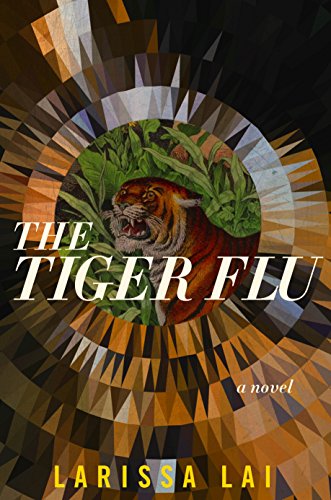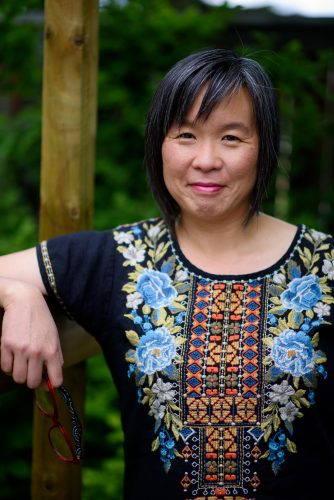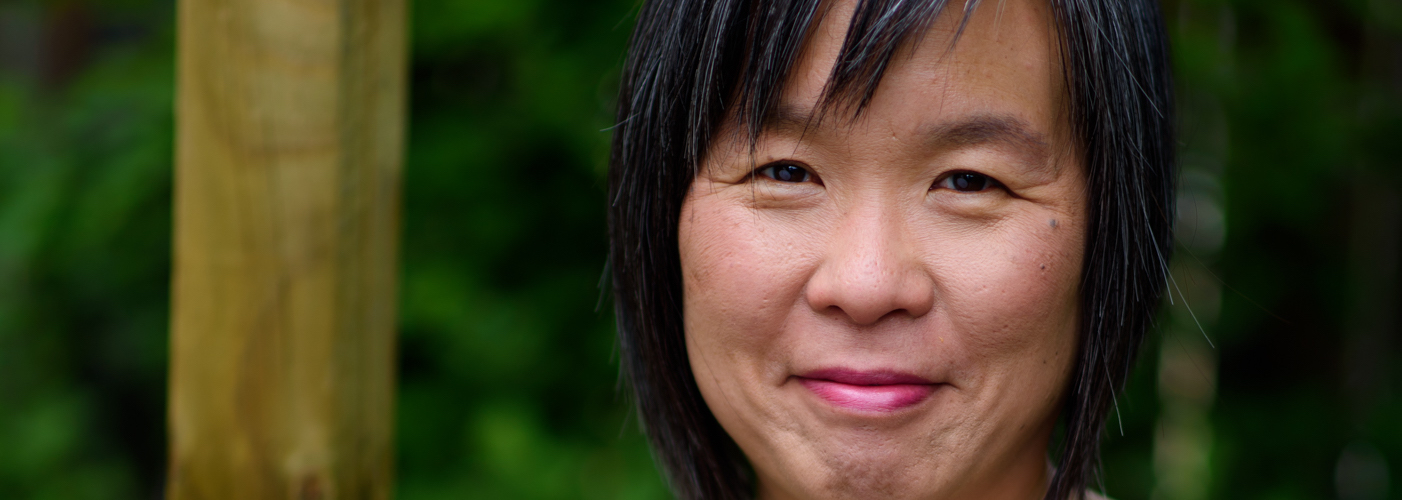5 Questions With Jim Duggins Prize Winner Larissa Lai

Author: Brian Gentes
May 20, 2020
The Jim Duggins, PhD Outstanding Mid-Career Novelist Prize is dedicated to the memory of author and journalist Jim Duggins and honors LGBTQ-identified authors who have published multiple novels, built a strong reputation and following, and show promise to continue publishing high quality work for years to come. It is made possible by the James Duggins, PhD Fund for Outstanding Mid-Career LGBTQ Novelists, a fund of the Horizons Foundation.
2020 Duggins Prize Winner Larissa Lai has authored six books, including Salt Fish Girl and The Tiger Flu. Addressing themes of futurity, ecology, memory, mythology, community, movement, race, gender and sexuality, her novels engage imaginative anti-realism while simultaneously connecting to the world as we actually inhabit it. Since the late 1980s, she has been engaged in arts activist and cultural organizing work. She has given talks and readings all over the world—from Nagoya, Japan to Wollongong, Australia to Nanjing, China, to Berlin, Germany to San Francisco, USA. Winner of the Lambda Literary Award and the Astraea Award, she has made the Tiptree Honor Book list twice. She has also been finalist for the Chapters/Books in Canada First Novel Award, the Sunburst Award, the City of Calgary W.O. Mitchell Award (twice), the bpNichol Chapbook Award, the Dorothy Livesay Poetry Prize and the Gabrielle Roy Prize for Literary Criticism. She was born in La Jolla, California; grew up in St. John’s, Newfoundland; and spent most of her adult life in Vancouver, British Columbia. With gratitude, she currently makes her home on Treaty 7 Territory, where she holds a Canada Research Chair at the University of Calgary and directs The Insurgent Architects’ House for Creative Writing.

Are there any LGBTQ writers or books that you count as formative influences to you as a writer? How did you discover them?
For me the biggie is an anthology put out by the now defunct Sister Vision Press called Piece of My Heart. Piece of my Heart is a lesbian of color anthology which was edited by Makeda Silvera and released in 1991. For me, writing community and social/political grounding are very closely connected, and writing is important to keep social/political communities grounded. I was fortunate enough to come up and out through a very supportive community in Vancouver in the early 1990s. Shani Mootoo was a friend, mentor and an important influence, especially her books Out On Main Street and Cereus Blooms at Night. A little bit later, I met speculative fiction writer Hiromi Goto whose Chorus of Mushrooms came out a year before my When Fox Is a Thousand, and the poet and water activist Rita Wong whose first book Monkeypuzzle came out in 2000. Chrystos’s Dream On was important, as was Dionne Brand’s No Language is Neutral. Brand’s What We All Long For, though it comes a bit later, was and remains a really key book for me. Hiromi and I met Nalo Hopkinson together in the early 2000s. Her Brown Girl in the Ring and The Salt Roads matter to me for the ways in which they bring “home” mythologies and image systems, as well as queer and racialized histories to the table. Also the little known but very brilliant jam ismail and her pun-ful chapbooks including sexions and diction air published in editions of ten or twelve and then surreptitiously photocopied and circulated among folks with an interest in gender and language have been very influential in terms of opening my ear to the Englishes of Asia and to the ways in which language is always already gendered. Persimmon Blackbridge, Lizard Jones, Susan Stewart and their collective Kiss and Tell were also formative. There was a book called Her Tongue on My Theory published in 1994 by Press Gang where many of us on the West Coast got our start. The dub poetry of Lillian Allen, as well as her committed and inspiring community work, have also been central to my world. I never met Monique Wittig, but Les Guerillères was a major influence on The Tiger Flu. Jeannette Winterson’s The Passion was also formative.
My influences have been my friends—some of them a bit older and supportive in a “big sister” kind of way, some of them the same age or younger. All have been generous. I hope the reverse is also true, and that I too have given them something of value. In this way, influence is exchanged and community gets built.
In many ways I have been so lucky in terms of influences and community. I’ve had the benefit of supportive communities that circulated around a number of community/arts spaces: The Vancouver Status of Women, ALOV (Asian Lesbians of Vancouver), Video In/ Video Out. There were also a lot important one-off gatherings in the early 1990s: In/Visible Colours Film and Video Festival, Writing Thru Race, The Appropriate Voice, First Ladies, Race to the Screen. I met Shani at one of these festivals. Or I was at a reading or an art opening and heard her read or speak. Maybe we read at the same reading together? We became friends and, together with another writer—the critic Monika Kin Gagnon, who has also been very important to me in the realm of anti-racist arts organizing—formed a writing group. We would meet on weekends, taking turns hosting. Shani introduced me to Barbara Kuhne and Della McCreary at Press Gang Publishers and encouraged them to publish my first novel. I met Hiromi because she called me some time in 1996 to have a conversation about our mutual interest in mythologies of our respective “old countries”. My influences have been my friends—some of them a bit older and supportive in a “big sister” kind of way, some of them the same age or younger. All have been generous. I hope the reverse is also true, and that I too have given them something of value. In this way, influence is exchanged and community gets built.
What does a writing day look like for you?
I wake up, I make tea and porridge. I leave the porridge to sit and take the tea to my desk. I try to dive right into the work if I can, preferably before all the sleep has come off me, when I’m still half in dream world and the irritations of daily life have not yet had a chance to infiltrate. If I’ve had dreams that I remember, I write them down. Then I try to get into the project at hand with a bit of freewriting. I think of this as a kind of visiting—the muse, the ancestors, my characters or whatever. Someone smarter and more in touch with history, mythology and the imagination than my ordinary “real world” self. It is like going to their house to see if they are home and if they have something to tell me. If they are home, and in a good mood, and have something to say, then I write until the voice runs out. Writing is a kind of transcription for me, in the sense that I am writing down what the voices say. More often than not though, the ancestor/muse isn’t there, or they’re there but they’re grumpy or shy or suffering a little dementia. I write down whatever fragments they are willing to give. Then I get the porridge, and feed myself while I feed my characters, by doing research or reading. Sometimes the ancestor/muse gets excited by what I’m reading and comes back and tells me more. More often, they go down for a nap. But the more I try to visit, the more likely they are to be there the next day with more to say in the field of the story or poem or essay. By the time I’m into the reading and research, email is going nuts, or I have to go teach or go to a meeting or check in with a student. Eventually, I have to cede creative time to work time. The rest of the day becomes about daily things—answering queries, working on the finances for the creative writing house I run, prepping lectures or talks or travels, grading, reading student work and providing feedback. On a good day, I’ll fit in a walk or a bit of yoga in the afternoon. I work until suppertime. After dinner I read, or watch TV or Netflix. At night, I try not to do anything too active because I find that that way lies burnout.
Are there other LGBTQ novelists working today whose work you particularly admire?
I admire very much my LGBTQ2S writer colleagues here at the University of Calgary: Suzette Mayr (Dr. Edith Vane and the Hares of Crawley Hall), Rain Prud’homme-Cranford (Miscegenation Round Dance) and Vivek Shraya (The Subtweet). There is a generation of younger LGBTQ2S novelists who are blowing my socks off. Kai Cheng Thom (Fierce Femmes and Notorious Liars, I Hope We Choose Love) is brilliant for her deep insight into the complications of community and her commitment to interrogating the dynamics of lateral violence. If we are to have a healthy and inspiring LGBTQ2S movement, we need to work on the ways we imagine, historicize and treat one another across “internal” differences. It is really difficult and dangerous to talk about lateral issues. Kai Cheng faces the fear and still does it—to my mind, this is real bravery. To top it off, she is a very talented writer, so she does it well.
Also powerful is Tom Cho’s work and his gender and genre bending fiction. I love his Look Who’s Morphing for its invocations of Dirty Dancing and Godzilla, and for the strange transformations that unfold in his book. He does both pop culture and anti-realism in ways that make me want to dance in the streets.
Joshua Whitehead is my graduate student, but I’m still allowed to admire him, right? His novel Jonny Appleseed tells the story of a Two-Spirit/Indigiqueer NDN glitterprincess trying to survive on the streets of big city Winnipeg in the week before his stepfather’s funeral. The writing is witty, biting, sexy and very down-to-earth. There are also writers who have been around for a while whom I feel don’t get the credit they deserve: Lydia Kwa (The Walking Boy) and Paul Yee (A Superior Man) jump to mind.
What are you reading now? Is there any book that you’ve found cathartic or instructive during the pandemic?
Right now I’m reading A Superior Man, Yee’s first novel for adults, about the Chinese sojourners who worked on the Canadian Pacific Railway and the Indigenous communities they met while doing that work. It is incredible. It’s an interesting demographic fact that most if not all of the best Chinese Canadian writers are LGBTQ, including Yee. I just finished Louise Erdrich’s Future Home of the Living God and Cherie Dimaline’s Empire of Wild—both great. In relation to the pandemic, as research for The Tiger Flu, I read quite a few apocalypse (some zombie-full, some zombie-free) and/or virus novels that I enjoyed a lot: Cherie Dimaline’s The Marrow Thieves, Emily St. John Mandel’s Station Eleven, Colson Whitehead’s Zone One, Kenneth Calhoun’s Black Moon, Cormac McCarthy’s The Road, David Walton’s The Genius Plague. I still need to read Waubgeshig Rice’s Moon of Crusted Snow. I think because I’ve been imaginatively inhabiting these apocalyptic spaces for some years, I didn’t feel that surprised when the pandemic hit. Whitehead, St. John Mandel, and McCarthy had already taught me not to be too attached to early 21st century comforts. Dimaline reminded me that Indigenous peoples have already survived one apocalypse already and are surviving another. Walton taught me about the powers of mutation. In spite of their incapacities to see some of the contradictions, I still feel I learned a lot too from second wave feminist speculative fiction especially Ursula LeGuin’s The Left Hand of Darkness and Marge Piercy’s Woman on the Edge of Time. There’s a special place in my heart for Joanna Russ’s The Female Man and Monique Wittig’s Les Guerillères, and the lesbian separatism of both writers, not because I want to go there—I know there are problems, the dangers of trans exclusion not the least among them—but because I still value the work of utopian dreaming. The pandemic is a good time to do that, though it’s also a grim time, which makes it hard to get into a utopian frame of mind.
What’s next for you?
I have a poetry book called Iron Goddess of Mercy coming out off of Arsenal Pulp Press next spring. The speaker of this book is possessed by a capacious army of furies to whom she writes letters. In the world of tradeable commodities, “Iron Goddess of Mercy” is a type of tea—a variety of oolong. The Goddess of Mercy is also much respected deity along the South China coast where my family has its roots and routes. The book addresses the ever-evolving history of Hong Kong, its various occupiers, and its diaspora. It also ponders the possibility of feeling in relation to such a home place when the political status of that home place is always shifting and never still. Along the way it takes up the contradictions of the so-called “dumpster fire” burning in the contemporary cultural field and the difficulties of struggling for justice in an ongoing history with more than two players. This poetry book is comprised of sixty-four fragments in honor of the sixty-four hexagrams of the Chinese turtle oracle known as the I-Ching.
My new project is a novel tentatively entitled The Lost Century. It is about a Chinese Canadian woman called Tobee Go, who goes to China to adopt a child and gets derailed in Hong Kong by her peculiar maiden aunt. The aunt tells Tobee the story of a man—Tobee’s grandfather—who poisoned his own first grandson in a misguided attempt to get revenge on the Japanese occupiers.
Click here for more information about the award and Jim Duggins, PhD.


